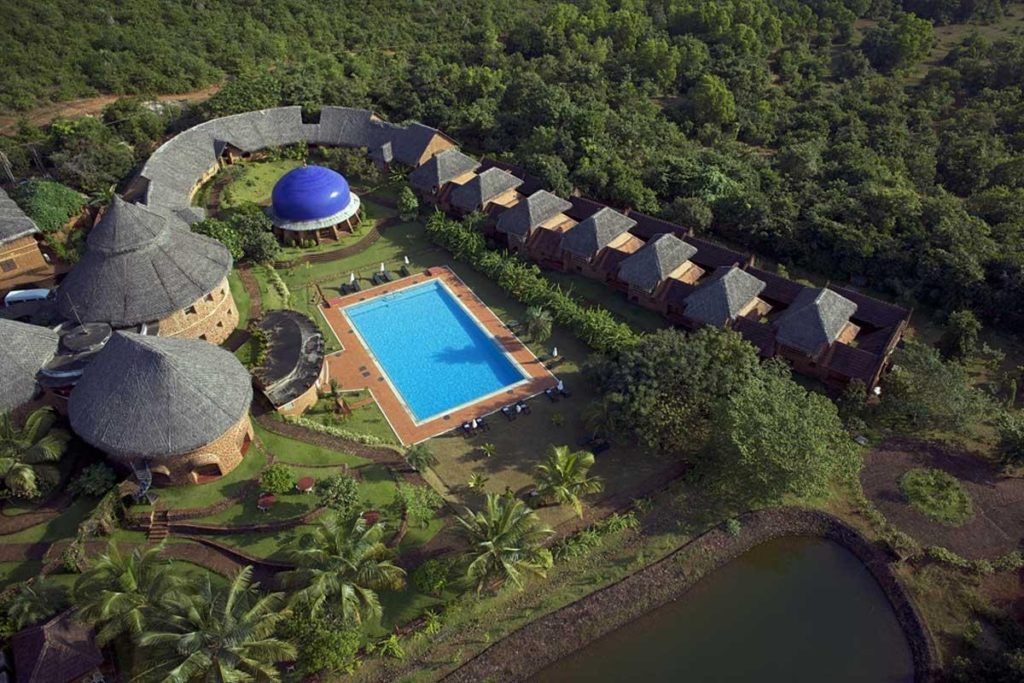We reside in a world with beautiful landscapes, eye-catching views and places reciting stories of the past. They call out to us to visit, to enjoy the scenic beauty, to have fun and to gather wonderful experiences. We all love to visit these attractive landmarks, don’t we? It’s the zeal of us humans to go out and explore the world that has given rise to the Tourism Industry.
The Tourism Industry has been successful in providing a quality experience to the tourists and generating a huge amount of income. According to the Ministry of Tourism, it has contributed to 5.20% of India’s GDP in the year 2015-16 and has generated employment for 81.1 million people in the year 2018-19. On the downside, the hotel industry, which plays an important role in Tourism, proves to be quite harsh to the environment. It has led to the depletion of natural resources; air, noise, and water pollution; and over-exploitation of non-renewable energy sources causing detrimental effects on the ecosystem. The rooms, restaurants, kitchen, laundry and technical services such as lighting, heating/cooling system, and electricity eat up a lot of natural resources and produce a huge amount of waste materials which are hardly recycled or reused.
In recent times, we are witnessing the rise of eco-tourism, which revolves around exploring areas that are nature-oriented, to promote tourism and awareness about environmental conservation at the same time. Eco-tourism sensitises us to nature and the local communities in the region. Today, hotels are also adopting a new mantra i.e. catering the needs of not only the guests but also of nature and taking care of it, ushering the rise of Green Hotels or Eco-Hotels.
Green hotels aim at providing quality service to the customers with proper consideration of the natural surroundings. It includes switching to renewable sources of energy, water conservation, reusing or recycling waste, reusing towels and linen, and cutting down energy consumption. Green Hotels can now be witnessed around the world, and I would like to cite some amazing examples to elucidate various facets of it.
New Zealand’s Camp Glenorchy, acknowledged by the TIME magazine as one of the “World’s Greatest Places” is recognized as one of the most sustainable hotels on Earth. It has been designed and constructed in accordance with the Living Building Challenge— a green certification program which is considered to have the most stringent standards. The hotel has a 500 sq. m wastewater wetland meant for the treatment of the water generated as waste. It is then used for irrigation and can also be returned back to the building for usage. Talking about these wetlands, landscape architect Steve Skelton says, “They provide a revelatory experience where the observer can better understand the relationship between human and natural processes.” Additionally, odour free compost toilets have been built which can save up to 300,000 litres of water per year and also the ground-source heat pumps, deep heat bores and solar thermal collectors function as the heating system for Glenorchy.
 Aerial view of Glenorchy shows a cluster of solar panels.
Aerial view of Glenorchy shows a cluster of solar panels.
Blue Water Resorts in Antigua have deployed BPA-free water bottles for guests along with water refilling facilities. Visitors are allowed to carry these bottles home in order to remind them of their experience in the hotel and to encourage them to reduce consumption of plastic products. They also cultivate fresh produce in the premises using recycled water, provide food waste to the local farmers as livestock fodder, operate on solar power and have eliminated motorized water sport services.
 Blue Water Resorts, Antigua.
Blue Water Resorts, Antigua.
The Pikaia Lodge in the Galapagos Islands has adopted schemes to protect the forest and wildlife of this region and it is worth appreciating. The building is made of the minimum amount of concrete and has incorporated lava stones found in the islands for the floor and wall. Solar energy is predominantly used for water heating purposes and lighting in the outdoors is reduced to avoid attracting insects which helps in not disturbing their natural feeding habit. Further, the lodge also practices rainwater harvesting, recycling of the waste as well as reforestation— wherein they have been successful in planting more than 10,000 trees endemic to the region.
 Low lighting in the outdoors of the Pikaia Lodge.
Low lighting in the outdoors of the Pikaia Lodge.
It won’t be acceptable if I don’t talk about our country, which isn’t far behind! The ITC Grand Chola has received a LEED (Leadership in Energy and Environment Design) certification for its sustainable practices, which include using wind energy for electricity, solar energy for water heating and sustainable materials for construction. The CGH Earth Hotels spread across South India are working with the local communities to preserve the biodiversity of the place. They practice rainwater harvesting, organic farming, and tree plantation and they also educate the employees and guests about the same. This kind of development in India does seem promising to protect the ecosystem and biodiversity in the future.
 CGH Earth Hotel, Karnataka.
CGH Earth Hotel, Karnataka.
Well, what is the use of running a hotel if it isn’t attracting people? It is equally important to determine what a person expects from a green hotel. According to a survey conducted in the western part of the United States, it is seen that consumers are ready to go for an eco-hotel and most of them agree to the policies adopted in favour of the environment. The practice that was most preferred by the people was energy conservation (89.6%). At the same time, most of them were reluctant to pay more for a green hotel. Yesawich et. al. (2008) believes that customers don’t want to pay more since they feel practices like these are more of an obligation rather than important. Also, consumers feel like they should be given guest reward points for choosing and supporting the green schemes of these hotels. A similar situation is evident in India too. Hotels around the world are facing the pressure to become environment friendly to meet the demands of the governing body as well as tourists. Hence, we can say that turning a hotel green can be an incentive for the hotel itself as well as for the natural world. Green hotels will have an advantage by being more in demand in an era where climate change and environmental deterioration is of utmost concern. Ecologically sound practices can also cut down costs and provide a healthy environment for guests and employees. Undeniably, nothing can be 100% eco-friendly, let alone a hotel. Nevertheless, certain aforementioned practices, if adopted by hotels, can lead to a minimum negative impact on the environment.
Overall, what I have interpreted is that not everyone can afford to reside in an eco-friendly inn and also there are just a handful of eco-hotels around. Constructing hotels like these does require a lot of creativity and investment. Hotels in Malaysia adopt ways for environment protection but don’t use solar panels or practice rainwater harvesting as they are too expensive to set up. Low-income countries may fall behind with respect to the establishment of Green Hotels. Aid from the governing body can help more Green Hotels to flourish and to turn existing hotels green. All of us should be responsible when staying in any hotel and try our best to conserve resources and energy. We Indians follow the notion “Athithi Devo Bhava” wherein we treat a guest as God. Similarly, the world should adopt the motto “Prakriti Devo Bhava” and treat nature as God, by respecting and protecting its integrity.
Author:

Sreelakshmi S Kumar
Sreelakshmi is pursuing her undergraduate course degree in Zoology from Fergusson College, Pune. The field of Immunology and Virology interests her the most. She harbours her love for science and teaching inside her, and she wishes to teach in the future. Dancing, reading and calligraphy are some of her leisure activities and she is a big foodie too!


Interesting! Tourism is a big part of modern lifestyle. People often mimic the hotel life and decor at their homes. If more of these Hotels come up, it will significantly contribute to the shift to sustainable lifestyles in people. Very insightful article!